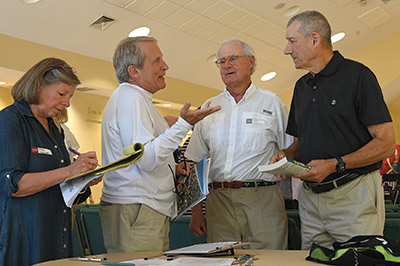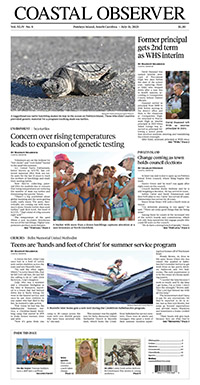Incorporation
Group debuts plan for new town with no property tax

A group that has spent two years developing a plan to form a new town on the Waccamaw Neck made its first public presentation this week, highlighting its goal to take control of land planning and unveiling a budget that will yield a $1.2 million surplus without a property tax.
“This has been a big question since Day 1,” said Andy Hallock, who leads the Pawleys Litchfield Municipal Study Group. “What’s going to happen to my taxes?”
Speaking to the annual meeting of the Litchfield Beaches Property Owners Association, Hallock said that state law prohibits new municipalities from imposing a property tax.
“If you walk away with one thought about property taxes, incorporation does not equal increased taxes,” Hallock said.
The largest share of revenue for the proposed town, $1.3 million, will come from a state tax on insurance premiums that is returned to cities and towns by the S.C. Municipal Association.
The study group has only provided information through emails and social media posts since announcing itself last summer.
“We were going to control the message,” said Hallock, who was the only member of the group identified publicly before the weekend meeting. Since they didn’t think the public knew much about incorporation, “there was an opportunity for it to be demagogued.”
Jim Register, a Willbrook resident and treasurer of the Litchfield Beautification Foundation, presented the financials for the proposed town.
Other members of the study group are Walter Wilkinson, Doug Wurst, Bill Ringer, Kary Saleeby, Bill Taylor and Cindy Person, who is the chief counsel for Keep It Green Advocacy.
They are now collecting signatures on a petition to present to the S.C. Secretary of State’s Office asking to hold a vote on incorporation. That could happen by the end of the year, Hallock said. The group hopes to have the signatures of 15 percent of the “qualified electors” this summer.
The proposed town, which would have a population of 16,400, will cover the area from Brookgreen Gardens south to DeBordieu.
Since the name “town of Pawley Island” is already taken, the incorporation ballot will offer several choices for the name of the new town, if it passes. For now, the study group refers to it by ZIP code: the town of 29585.
The goal of controlling land use decisions resonated with Litchfield Beaches property owners.
Elliott Powell said he was concerned about a tract at the corner of Highway 17 and Boyle Drive that is zoned for commercial use.
“That looks like a condominium complex to me,” he said. “Everybody needs to be aware of what’s involved.”
The incorporation study group formed while the county worked on a new land use plan. It went public after the plan was approved by the Planning Commission. Hallock said that will lead to increased development once Georgetown County adopts new zoning districts to implement the plan.
A new town will create a new land use plan. Under state law, that will be required before it can adopt zoning.
Of the $874,140 the group says it will cost to operate the town in the first year, $130,000 will go to a town manager and $120,000 will be spent on planning and zoning, “based on the input that we’ve gotten from experts that work in that field,” Register said.
It also proposes paying the mayor $15,000 and the four council members $10,000 each. A clerk and other office staff, along with taxes and insurance, bring the total cost for personnel to $570,490.
The town will also need to hire an attorney and an accountant and rent “modest office space,” Register said.
Along with its petition from electors, the group will have to provide the Secretary of State’s Office with documentation on how it will provide “the minimum service standard” in 10 areas including law enforcement.
“Philosophically, what we are looking to do is to partner with the county. The model is the town of Pawleys Island,” Hallock said.
The island, with a year-round population of fewer than 150 people and a peak summer population of about 5,000, has no municipal property tax. Its budget is $2.58 million, which includes grants and $395,000 from the insurance tax.
The town’s biggest expense is its police department, but it also receives coverage from the Georgetown County Sheriff’s Office when its four officers are off duty.
The other services are outsourced, Hallock said.
“Our plan proposes tax-supported service currently provided by the county will continue,” he said. “We’re paying for these services already. Why would you pay for them twice? It makes no sense.”
The proposed town expects to receive $444,000 in state aid and $334,000 in other fees, for total revenue of $2.08 million, Register said.
One revenue source that didn’t figure into his presentation was accommodations tax. The town of Pawleys Island gets 48 percent of its revenue, $1.26 million, from a combination of state and local accommodations taxes.
Register said afterward he was still working on accommodation tax numbers.
The state’s 2 percent accommodations tax generated $2.4 million for Georgetown County in the last fiscal year. Most of it came from the Waccamaw Neck.
If a new town is created in the 29585 ZIP code, accommodations tax collected in that area would be returned to that area, according to a spokesman for the state Department of Revenue. State law would require 30 percent to be spent for tourism marketing. The town could use 65 percent for “tourism related expenditures.”
In the town of Pawleys Island, all of the 65 percent money supports town operations. In the county, it goes to organizations including the Litchfield Beaches POA and the Litchfield Beautification Foundation for projects that support tourism.
Even without that revenue or a property tax, Register said the proposed town has “financial viability.”
The POA members seemed supportive. Several asked how soon the town could be established.
Others pointed out that the effort will face opposition, including one man who suggested that the mistrust of government that affects Georgetown County could influence decisions on creating a new town.
Register agreed that was a possibility, but he and Hallock both stressed that the point of the incorporation effort is to let people know they have a choice.
“You’ve got to start somewhere,” Register added.




